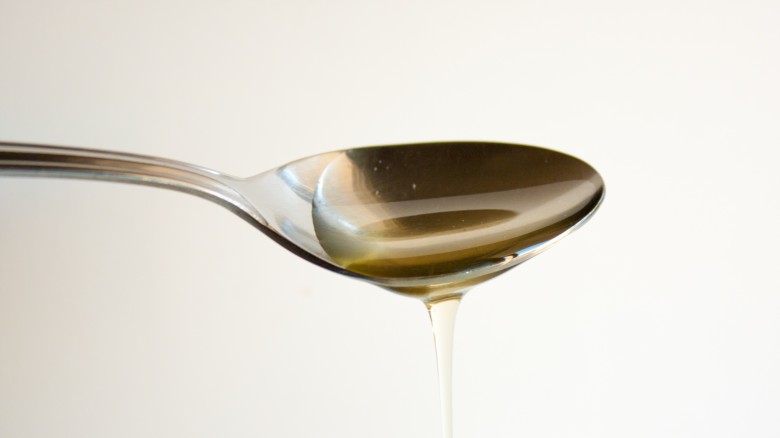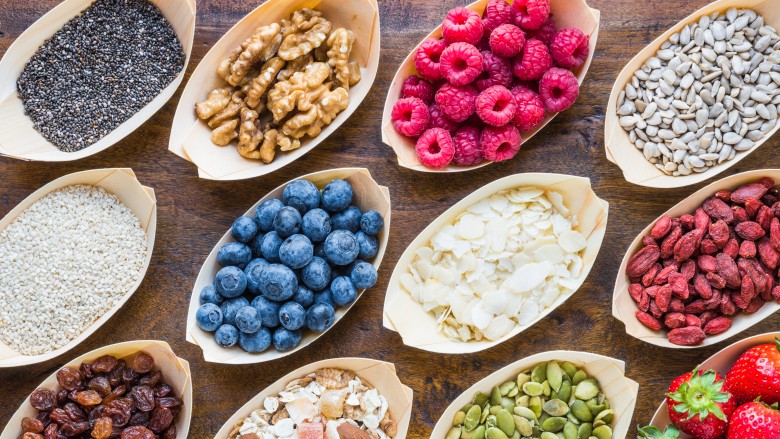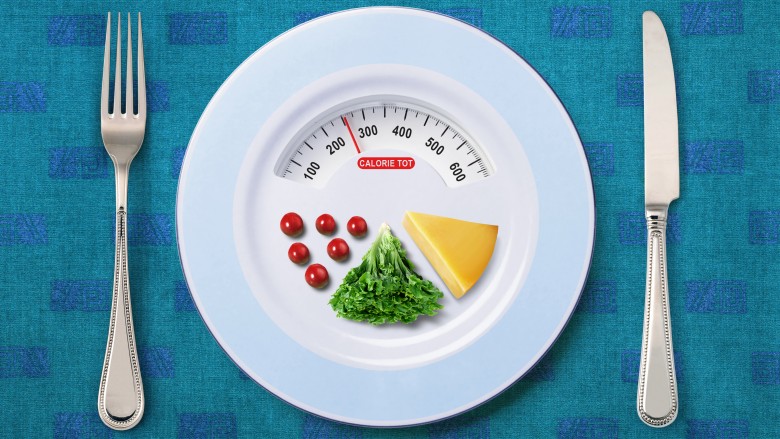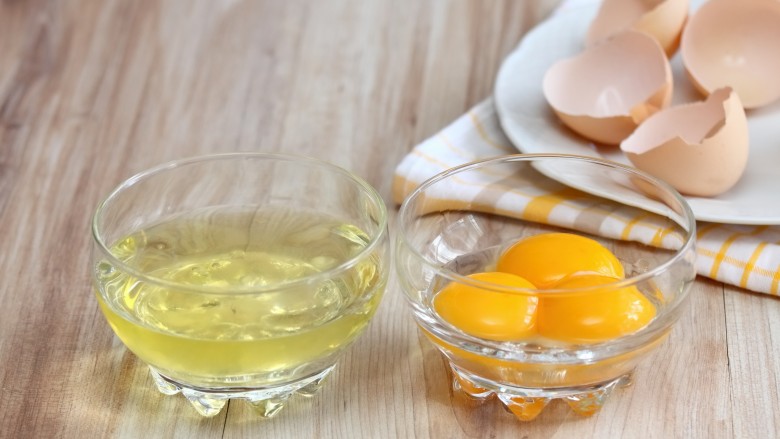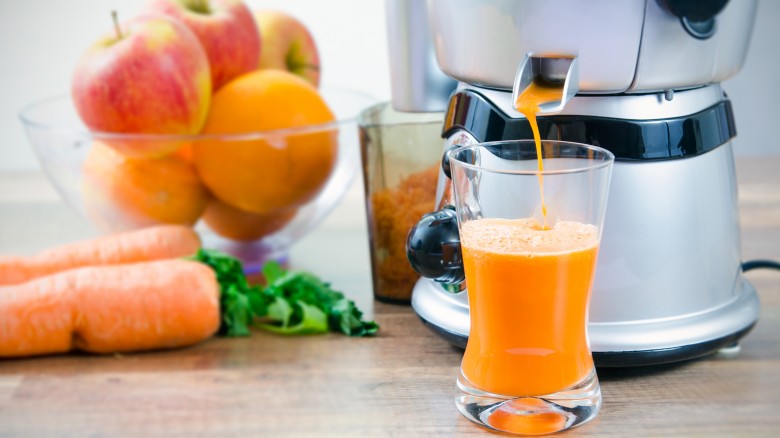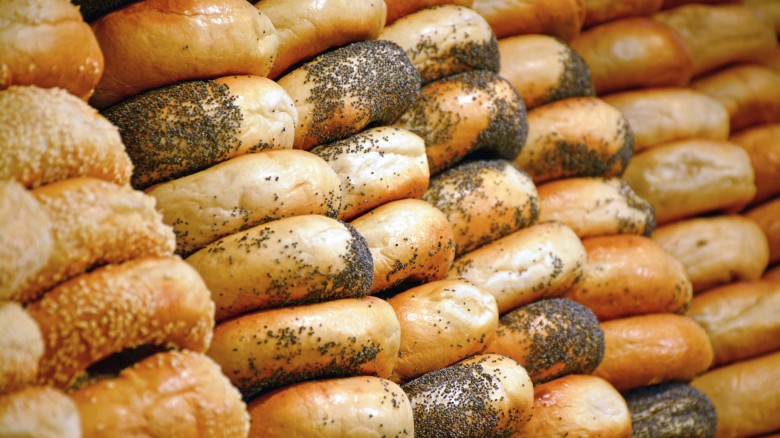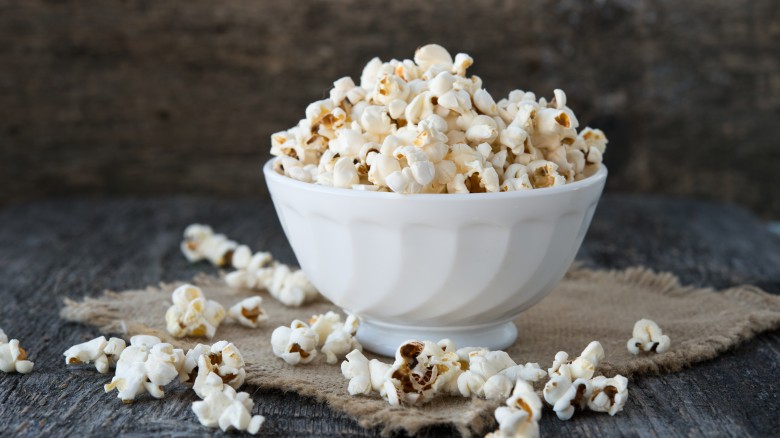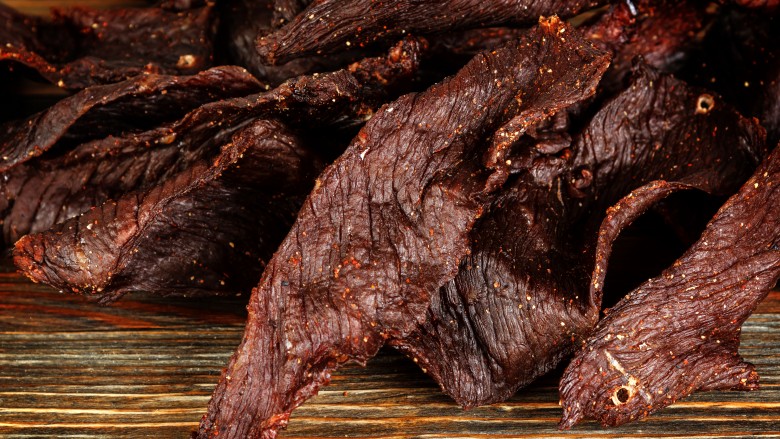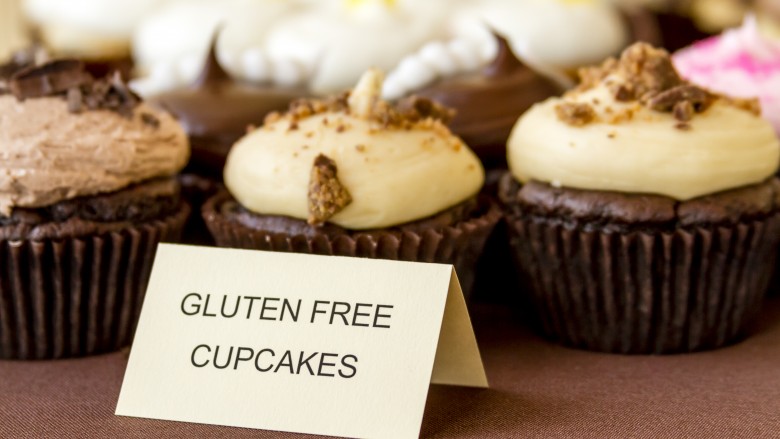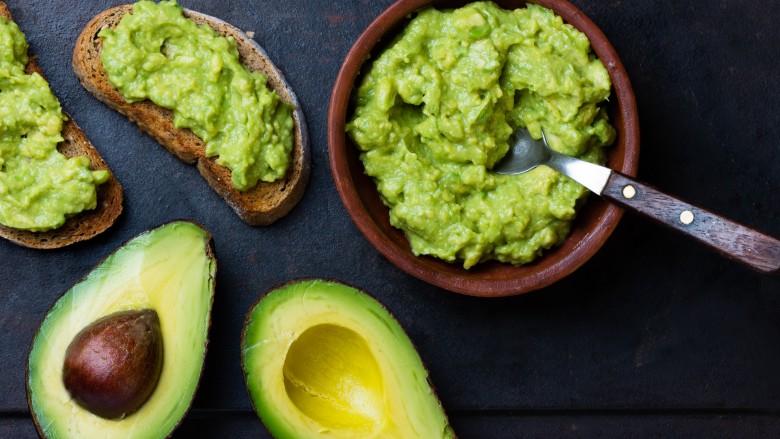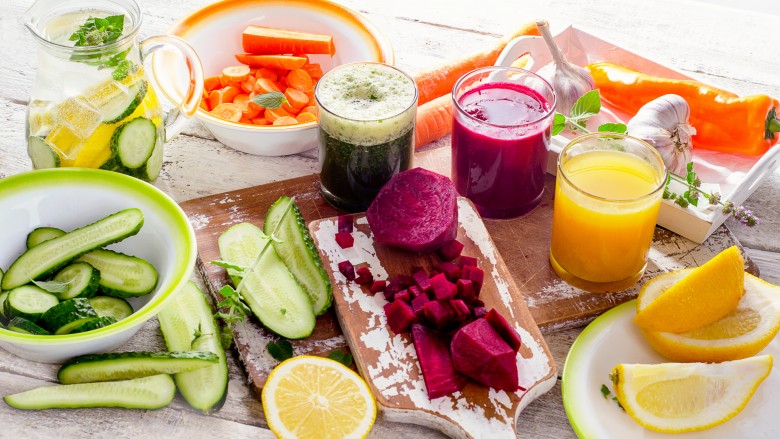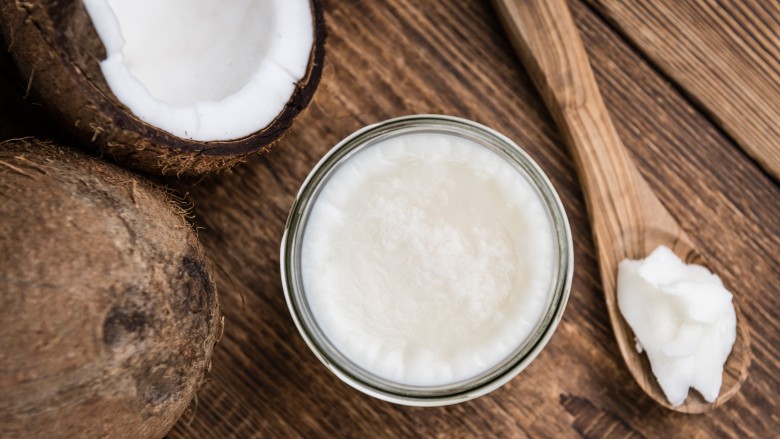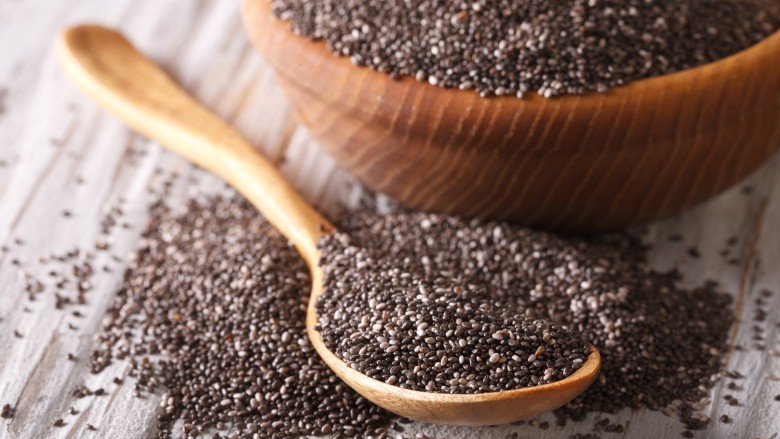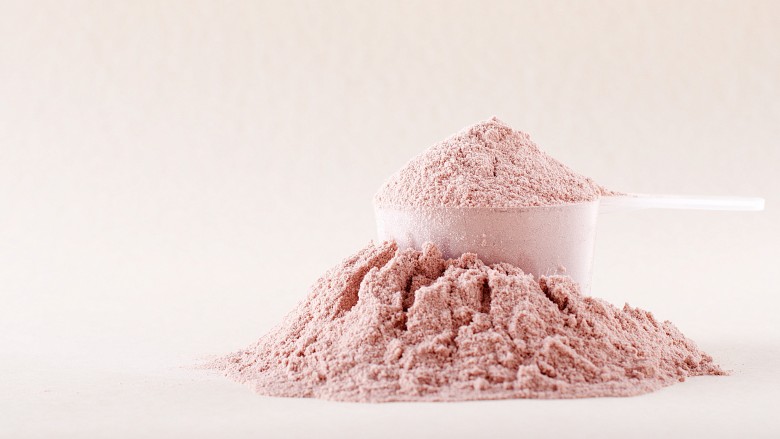False Facts About Health Foods You Always Thought Were True
I am a self-proclaimed nutrition nut. I could spend hours scouring Pinterest and Instagram for the perfect smoothie bowl or quinoa salad. However, keeping up with the latest nutrition trends can be a little exhausting. Put chia seeds on everything! No wait, you need bee pollen in your life. And if you're not eating coconut by the truckful, then you must really not care about your health after all.
Fortunately for me, there are knowledgeable and down-to-earth nutritionists out there to help us sift through the fads and stick with the foods that will give our bodies the nutrients they crave. Here are some common misconceptions when it comes to healthy eating.
Agave nectar is a guilt-free sweetener
I have seen agave nectar all over the health food blogs. Instead of that deadly sugar, go ahead and pour a natural sweetener like agave syrup all over your cakes and cookies. However, turns out agave isn't that natural after all. "Agave nectar is a highly processed syrup that is 1.5 times sweeter and actually more calorically dense than regular table sugar," Meghan Sylvester, a nutritionist at Shady Grove Fertility Wellness Center told me. "It is primarily made up of fructose (similar to high fructose corn syrup)."
Because our bodies cannot use the energy from fructose, we simply save it up in the liver for later. "Fructose is processed in the liver where it is stored as backup energy," explained Sylvester. "When fructose is consumed in large quantities, and the liver cannot store any more, it converts the excess fructose into fat, triglycerides, and very low-density lipoproteins (VLDL), which can lead to fatty liver, hyperlipidemia, and insulin resistance, all increasing the risk of heart disease and diabetes."
Rather than loading up on agave nectar, Sylvester recommended trying other, more natural sweeteners. Raw honey, stevia, and puréed dates are all healthier alternatives.
Super foods are essential
Super foods have gotten a lot of attention in recent years. Why have a strawberry banana smoothie when you could have an acai bowl? However, don't get swept up in super food fever just yet.
"We keep hearing about goji berries and other exotic super foods, but all plant foods are super," Matt Ruscigno, MPH, RD told me. "Apples, strawberries, and even that red cabbage that's so often left as a decoration are all full of the phytonutrients that makes all whole plant foods superfoods and super disease fighters."
Jan Patenaude, RD, CLT agreed. "All 'super foods' are not super for everybody! Just as somebody can have allergies to something healthy like organic strawberries, people can also have food sensitivities to some 'super foods,'" she explained. "I've had clients where lettuce and arugula triggered migraines, turmeric triggered arthritis, and kale triggered irritable bowel syndrome." Make sure to steer clear of the super food hype and do what's right for your own body.
Low-calorie diets help you lose weight
If you want to lose weight, you simply need to eat less and exercise more, right? Many people have found weight loss success with apps that help them track their food and calories. However, don't go too low on the calories.
Kimberly Hershenson, LMSW specializes in eating disorders and cautioned against the low-calorie trend. "Eating low-calorie food actually lowers your metabolism, sending your body into starvation mode. Your body will then hold onto all calories you put in which actually slows down weight loss," Hershenson told me. "Additionally, your body will break down calorie-burning muscle tissue for energy. The key is to eat a healthy small meal every three to four hours. This keeps you satisfied, keeps your metabolism up, and keeps [you] from overeating later in the day."
Egg whites are healthier than eggs
I used to be the girl that only ordered egg white omelets at brunch. Sure, I'd have a mimosa and side of hashbrowns, but egg yolks? Are you crazy? Fortunately, I've gotten over my fear of the yolk. "People often think that it is healthier to avoid egg yolks and only eat the egg whites," Registered Dietitian Linzy Ziegelbaum told me. "However, this is not true since the cholesterol in the food we eat is not what contributes to high blood cholesterol. Most of the vitamins and minerals are found in the yolk including vitamins A, D, E, K, B12, B6, choline and selenium."
Egg whites don't contain much nutrition and could leave you feeling hungry much sooner than if you had indulged in the entire egg. And let's be honest, the egg yolk is nothing compared to what else is on your plate. If you're enjoying your egg white omelette with a side of bacon and tater tots, the egg whites alone won't save you.
Functional diagnostic nutrition practitioner Cate Ritter agreed. "For the majority of the population, dietary cholesterol has little effect on serum cholesterol," she told me. "In fact, whole eggs can raise good cholesterol levels and are beneficial for health. Eating eggs has little to no effect on heart disease or stroke risk."
You need a juicer
Green juice has been a health craze that is hanging on. Just walk through Whole Foods and take a look at the refrigerated section. You'll see an entire wall full of vegetable juice promising to help you lose weight and look younger.
Ziegelbaum cautions that your green juice is definitely not as nutritious as actually eating whole fruits and vegetables. "This is not the case because when you juice fruits and vegetables you lose the fiber," she said. "Fruit juice also has a lot more sugar than whole fruits. If you were to make a small cup of fresh orange juice it would take close to three to four oranges. Most people would not eat three to four oranges at one time."
Carbs are evil
It's time to put this one to bed. Our bodies need carbs to survive! Each of the experts I spoke with recommended a healthy supply of carbs throughout the day.
"Carbohydrates are a source of fuel for our bodies, and a good source of fiber and many vitamins," Ziegelbaum told me. "Instead of avoiding all carbohydrates, focus on whole grains, beans, and fruits and limit refined carbohydrates."
If you've ever tried a low-carb diet, you know how terrible you feel in the beginning. Maybe you lost weight, but you probably also wanted to kill your entire family at some point. That irritability comes from the fact that our brains need carbs. "Our brain actually prefers to use carbohydrates as its fuel source, so eliminating the necessary nutrient is only going to throw your body out of balance," Emily Holdorf, owner and consulting dietitian for EmPowered Nutrition, told me. "Whole grains are protective from heart disease due to their fiber content."
Microwave popcorn is a healthy snack
Popcorn seems like the perfect snack for anyone wanting to lose weight. It's a whole grain, high in fiber, and low in calories. However, when you buy the microwavable bag, you're getting a lot more than you know.
"While popcorn is considered a whole grain, you'll want to avoid the microwave kind. It's a processed food that is loaded with fat and sodium and even worse, the bag lining has diacetyl in it," Rebecca Lewis, in-house dietitian at HelloFresh, told me. "This chemical gives popcorn its buttery flavor, however, it is also toxic when heated! Instead try plain popcorn and sprinkle with nutritional yeast flakes which has a cheese-like taste and texture without the calories and fat."
Beef jerky is a great snack
Many paleo and low-carb blogs tout the benefits of jerky. It's a convenient snack and loaded with protein, so it keeps you full. However, it's also loaded with salt.
"While this easily tote-able food quickly gives you access to protein on the run, most jerkies are chock full of sodium to preserve the meat," explained Lewis. "All of this sodium causes water retention and bloating, not to mention the long-term effects of high blood pressure! Instead, opt for low-sodium turkey jerky." Turkey jerky gives you the same savory flavor without all the salt. It's also more fun to say.
Gluten-free products are healthier
Gluten-free products are everywhere. I was recently at the grocery store and noticed that the milk containers now boast "gluten-free!" It's a trend that's not going anywhere. However, if you've been hesitant to give up your beloved bagel or pizza, don't sweat it. Most of us don't need to go gluten-free.
"Going gluten-free is only truly necessary for people with celiac disease or a gluten intolerance or sensitivity. When we don't have these conditions, our bodies know how to process gluten because it is naturally found in foods," Holdorf told me. "[G]luten-free products may be made with refined flours that are nutrient poor."
Eating an entire box of gluten-free cookies is not healthy. You'd be much better off eating a few bites of the real thing. "Gluten-free products often have more added fat and sugar than their regular wheat-containing counterparts to make up for taste and texture issues," Registered Dietitian and food blogger Kaleigh McMordie told me. "Whole wheat breads and pastas are part of a healthy diet, and if it's not medically necessary, there is no reason to seek out gluten-free products."
Eating fat makes us fat
Being afraid of fat is so '90s. That is when we saw the rise of fat-free products, but there was just one problem. The fat in your favorite crackers or cereal was simply replaced with sugar. Our bodies actually need fat everyday. "Since fat contributes to flavor, a lot of fat-free items, like coffee creamer and yogurts, put extra sugar in there to make sure it still tastes good," warned Holdorf. "Also, fat helps you feel satisfied and full, so when you reach for that fat-free ice cream you may actually eat more than you would if you just went for the real full fat version."
Like any other food in your diet, fats need to be limited, but don't cut them out altogether. "Fat is a necessary nutrient that our body needs to run properly," explained Holdorf. "It doesn't automatically make us fat when we consume it."
McMordie agreed with the need to be skeptical of fat-free products. "Products with fat removed, like fat-free dressings or baked goods, are often higher in salt, sugar, and emulsifiers and even have more calories than the originals," explained McMordie. "Sometimes it's better to go with the regular version — read your labels! Better yet, make your own dressings at home with olive oil, flavored vinegars, and spices."
Our bodies need regular detoxes
These days there is a detox for just about everything. You could do a short 24-hour plan or dive in to a month-long program. However, when you participate in a detox, what are you actually detoxifying from your body?
"This is one of the biggest myths out there," shared Holdorf. "So many of us think we need to go on juice cleanses, soup diets, or take a bunch of supplements to detox our bodies. No. Our body is so smart and naturally cleanses itself."
Many cleansing products recommend regular detoxes to clear out our bodies. However, we already have an organ that does that perfectly. "There are so many liver cleanses out there, but the truth is the liver doesn't need any help detoxing," Holdorf explained. "Its main function is to naturally detox the body by regulating chemical levels in the blood and clearing the blood of drugs and other potentially harmful substances."
Coconut oil is a health food
Coconut oil is everywhere right now. I've seen food and health bloggers cooking with it, stirring it into their coffee, and even eating it by the spoonful. I actually use it on my hands for dry, chapped skin. However, it may not be the miracle food we make it out to be.
"Coconut oil has this health halo that it really doesn't deserve. Coconut oil is a fat, just like butter or olive oil, and like butter, it is high in artery-clogging saturated fat," McMordie told me. "There are no studies to back up the health claims of coconut oil, so please stop eating it by the spoonful and putting it in your coffee. You wouldn't eat a spoonful of butter, would you? That said, coconut oil is useful in the kitchen as a vegan substitute for butter in things like pie crust!"
This, however, is a polarizing subject. In fact, some studies have found that trans fat, rather than saturated fat, is the real problem when it comes to clogged arteries. Still, diets high in saturated fat do lead to higher overall rates of mortality, so there are probably better ways to get your healthy fats than blending them up in your morning joe.
You should put chia seeds on everything
In my past life as a food blogger, I tried all the trends. I stirred flax seed into my oatmeal, baked coconut flour muffins, and consumed chia seed pudding like it was going out of style. I felt like I needed to invest in a lot of expensive ingredients in order to be truly healthy.
"I blame social media for the smoothie bowl craze and the need to top everything with chia seeds, hemp hearts, bee pollen, and whatever other 'health' food you can find," McMordie told me. "In reality, you really don't need all of these expensive extras, especially if you don't like them. Don't feel like you need to run out and buy them I personally like chia seeds for a little extra texture in protein in my oatmeal and yogurt, but if you eat a balanced diet, you are probably getting all the essential nutrients."
Your smoothie needs protein powder
We know protein is vital to staying full throughout the day. If you have been trying to drop a few pounds, just eating a plain salad at lunch is not going to cut it — you need a little chicken breast or chickpeas to satisfy you. However, don't go crazy with the protein products.
"The push for more protein in everything is marketing. People generally get enough protein if they consume a normal balanced diet," explained McMordie. "Protein cookies, protein cereal, protein pancakes. They're really not necessary. If you feel like you're lacking in protein, drink a glass of milk or eat a container of Greek yogurt. There's no need to run out and buy protein powder to put in everything."
And while we're at it, you can go ahead and toss your protein bars as well. "Many of them are just glorified candy bars with protein powder in them, so read your labels," said McMordie. "If there's more than 15 grams of sugar, you're eating a candy bar."
Listen to your body
So many of the health myths that we get caught up in come from listening to outside influences. No blogger or celebrity knows your body better than you. Eat what makes you feel good, and talk with your doctor or dietitian if you have questions. And just skip the bee pollen altogether. Yuck!


